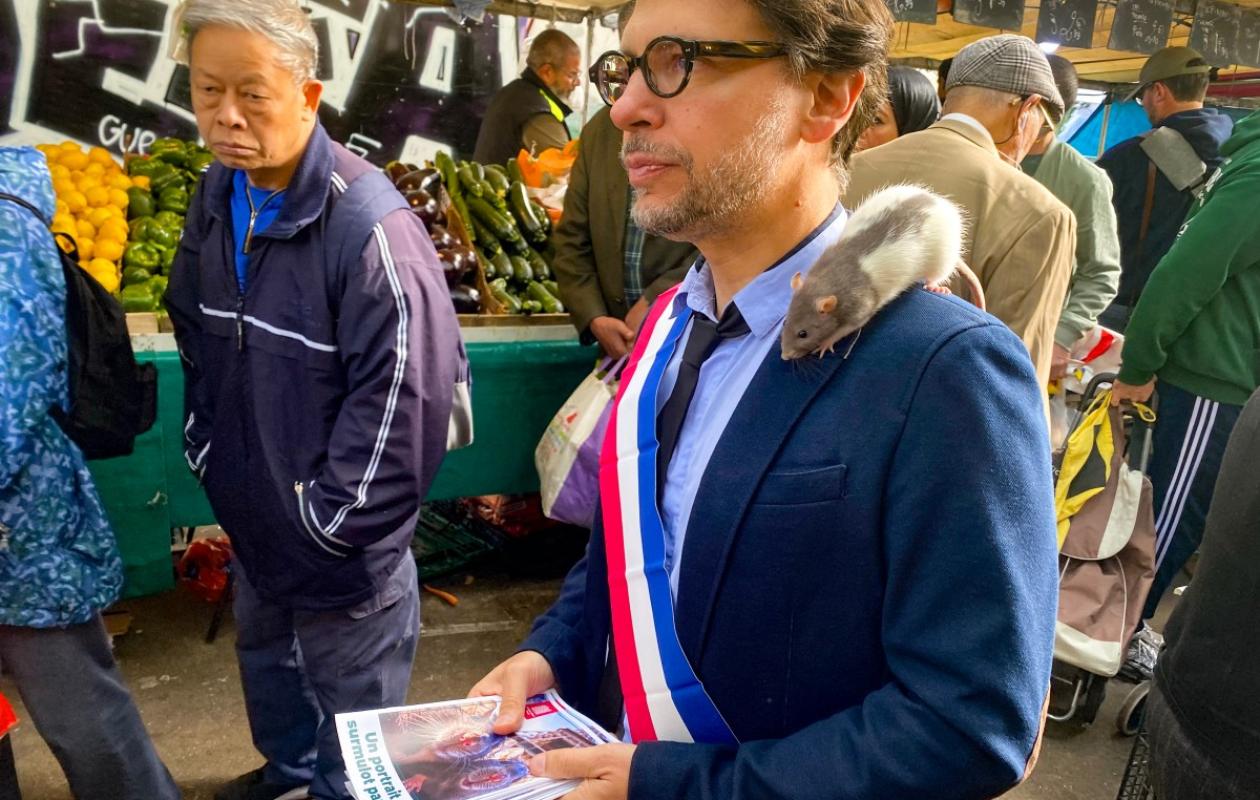
A Paris, les rats trouvent un allié politique inespéré
'
With his small, round black eyes and long, twitching whiskers, he has all the hallmarks of a common rat, but Plume has the rare privilege of touring the neighborhood perched on the shoulder of his owner, a local Parisian politician.
Deputy mayor of the 11th arrondissement in eastern Paris, Grégory Moreau has taken on the improbable mission of reconciling his constituents with the Parisian rat population, said to far exceed that of the French capital's 2 million inhabitants.
"Hello, have you ever met a rat?" the Animal Rights Party representative asks a woman laden with shopping bags at the Belleville market. "Look what I'm carrying on my shoulder," he continues.
After a skeptical first glance at the animal, the woman smiled. "Is this Ratatouille?", a reference to the famous Disney cartoon character in which a rat plays a French chef.
The task promises to be tough: labeled "harmful," the rodent suffers from a serious lack of popularity. "Rats have a bad image because they helped spread the plague in the 14th century," explains Mr. Moreau.
However, the role of animals in the transmission of diseases is negligible today, except in the case of leptospirosis, a bacterial infection from animals to humans occurring primarily in the countryside.
Gregory Moreau tirelessly campaigns to change this perception, for example by distributing leaflets showing clean rats against the backdrop of the Eiffel Tower, and by striving to convince passers-by of their usefulness.
"They eat about 100 tons of garbage a day in Paris," he says, preventing the sewer pipes from clogging.
The elected official concedes that controlling this population is necessary, as Parisians regularly complain about the presence of rats in children's playgrounds and parks in the capital.
But according to him, there are gentler methods than the poison usually used, which he considers not only cruel but also ineffective, because the rodent becomes immune to its toxicity and often learns how to avoid the traps.
Instead, he recommends not leaving food waste lying around on the streets, especially near fast food outlets. "If rats can't find food, they won't multiply as quickly," he argues.
Unsurprisingly, the animal rights leader has some fierce detractors, first and foremost Geoffroy Boulard, mayor of a wealthy neighborhood in western Paris. The man earned the distinction of being the rodent's chief opponent after the publication in the daily newspaper Le Parisien of a photo of him holding four rat corpses by the tail.
A reputation that earned him an invitation last year to the first edition of the National Urban Rat Summit in New York.
"Anyone who claims we should coexist with rats is living in a fantasy world," Mr. Boulard said. Any laissez-faire approach to this matter "threatens public health," according to the elected official, who installed traps that attract the animals with food, before killing them using a remotely triggered mechanism.
These traps, which cost 800 euros each, kill around 800 rats per year—a tiny fraction of the target animal population.
But Geoffroy Boulard believes his initiative will be a success, based on a drop in the number of reports of the animal by residents on a dedicated website.
Commentaires (0)
Participer à la Discussion
Règles de la communauté :
💡 Astuce : Utilisez des emojis depuis votre téléphone ou le module emoji ci-dessous. Cliquez sur GIF pour ajouter un GIF animé. Collez un lien X/Twitter, TikTok ou Instagram pour l'afficher automatiquement.